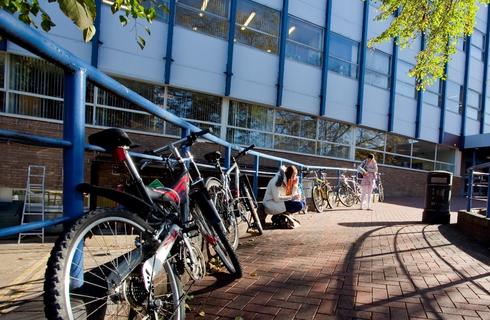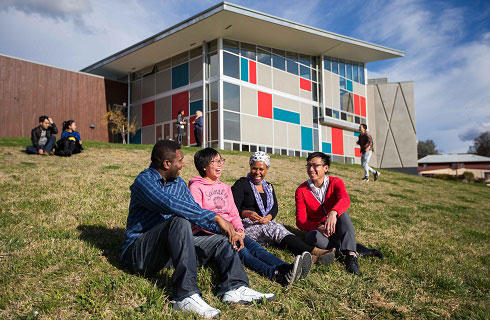机械工程哲学博士-流体科学热学
Doctor of Philosophy in Mechanical Engineering-Thermal, Fluids Sciences

学历文凭
Ph.D.

专业院系
Department of Mechanical Engineering

开学时间

课程时长

课程学费

国际学生入学条件
IDP—雅思考试联合主办方

雅思考试总分
6.5
- 雅思总分:6.5
- 托福网考总分:80
- 托福笔试总分:160
- 其他语言考试:DuoLingo scores - minimum score required by the Graduate School is 115.,A minimum score of 53 is required on the PTE Academic test.
CRICOS代码:
申请截止日期: 请与IDP联系 以获取详细信息。
课程简介
Thermal-Fluids Sciences involves the application of experimental techniques and mathematical methods based on principles from physics, fluid and gas dynamics, and heat transfer to the development and operation of energy conversion systems, such as solar panels, wind turbines, and internal combustion engines. Research projects currently conducted by faculty in the thermal fluid sciences involve heat and mass transport processes, microfluidics, fluid dynamics, hydrodynamic stability theory and fluid-structure interaction problems, many are associated with biological and medical applications. Employing a combination of experimental methods with mathematical models, we are investigating the effects of fluid dynamics and heat and mass transfer on strategies for the delivery of therapeutics agents within tissue and through the circulatory system, the design of biomedical devices for the identification and separation of specific biological cells, and for manufacturing novel materials and coatings with localized material properties.
相关申请
 预科
预科 奖学金
奖学金 实习机会
实习机会 在校学习
在校学习 跨境学习
跨境学习 校园授课-线上开始
校园授课-线上开始 在线/远程学习
在线/远程学习
开学时间&学费
学费信息仅供参考,请与IDP联系以获取详细信息
| 开学时间 | 时长 | 学费 | 地点 |
|---|
学校排名

世界排名501
数据源:
泰晤士高等教育世界大学排名
关于马里兰大学巴尔的摩分校

马里兰大学-巴尔迪默分校创建于 1963 年,是一所公立综合大学。该校分为三个学院,数学与自然科学学院,工程和信息科技学院以及艺术人文和社会科学学院。马里兰大学提供本科和硕士项目,专业多达54个。 马里兰大学共有学生1万多名。师生比1:20。校园社团活动丰富,全校有250个学生组织和20个兄弟会和姐妹会。 学校占地 500 英亩,距离巴尔迪默市区15分钟车程,距华盛顿特区45分钟车程。马里兰大学的研究和科技园占地71英亩,为许多大学合作的科技、生化和实验组织提供研究基地,其中不乏美国政府研究机构。 马里兰大学在美国大学排名2012为第157名. 校园社团活动丰富,全校有250个学生组织和20个兄弟会和姐妹会。
本校相关课程

Bachelor of Science in Statistics
学历文凭
Bachelor Degree
开学日期
课程费用总额


Bachelor of Science in Mathematics
学历文凭
Bachelor Degree
开学日期
课程费用总额


应用数学哲学博士
学历文凭
Ph.D.
开学日期
课程费用总额


应用数学理学硕士
学历文凭
Masters Degree
开学日期
课程费用总额


Bachelor of Fine Arts in Visual Arts
学历文凭
Bachelor Degree
开学日期
课程费用总额


Bachelor of Arts in Visual Arts
学历文凭
Bachelor Degree
开学日期
课程费用总额

其他相关课程

机械和机电工程学博士学位
 滑铁卢大学
滑铁卢大学学历文凭
Ph.D.
开学日期
课程费用总额


机电工程应用科学学士学位
 滑铁卢大学
滑铁卢大学学历文凭
Bachelor Degree
开学日期
课程费用总额


机械工程应用科学学士学位
 滑铁卢大学
滑铁卢大学学历文凭
Bachelor Degree
开学日期
课程费用总额


机械与工业工程哲学博士
 多伦多都会大学
多伦多都会大学学历文凭
Ph.D.
开学日期
课程费用总额


机械与工业工程学硕士
 多伦多都会大学
多伦多都会大学学历文凭
Masters Degree
开学日期
课程费用总额


机械和工业工程应用科学硕士
 多伦多都会大学
多伦多都会大学学历文凭
Masters Degree
开学日期
课程费用总额










 美国
美国